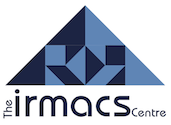Visual Analytics as a Cognitive Science
This talk explores the larger implications of visual analytics-- "the science of analytical reasoning facilitated by interactive visual interfaces"-- for cognitive science and informatics. I will argue that the methods that will advance this new science go beyond those of natural science and engineering, and will require researchers to create a new translational cognitive science of analytic systems. We will begin by building field study methods that characterize human and computational cognitive capabilities as they are used for decision-making in a range of situations. Because findings from field methods do not generalize well, we must then investigate these proposed capabilities in the laboratory. Finally we must build mathematical and computational theories that predict the impact of changes in technology on cognitive processes in technology-rich environments. These methods will only suffice until processing capacity reduces the lag between an analyst's query and a graphical response to a certain level. When the response is generated at the same pace as the sequence of cognitive operations that the analyst performs, human and computational processes become "close coupled". At this point the distinction between processes originating from the mind of the analyst (i.e. a mental representation) versus the computer (i.e. a visualization) become impossible to determine, and the subsystems we will study will seamlessly incorporate natural and artificial processes.


